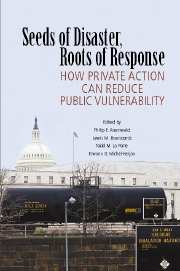Book contents
- Frontmatter
- Contents
- List of Contributors
- Foreword, by General Robert T. Marsh
- Preface
- Acknowledgments
- I SEEDS OF DISASTER
- II A CRITICAL CHALLENGE
- III MANAGING ORGANIZATIONS
- IV SECURING NETWORKS
- V CREATING MARKETS
- VI BUILDING TRUST
- 22 Public–Private Collaboration on a National and International Scale
- 23 Information Sharing with the Private Sector: History, Challenges, Innovation, and Prospects
- 24 Sharing the Watch: Public–Private Collaboration for Infrastructure Security
- 25 The Paris Initiative, “Anthrax and Beyond”: Transnational Collaboration Among Interdependent Critical Networks
- VII ROOTS OF RESPONSE
- References
- Contributors
- Author Index
- Subject Index
22 - Public–Private Collaboration on a National and International Scale
Published online by Cambridge University Press: 30 July 2009
- Frontmatter
- Contents
- List of Contributors
- Foreword, by General Robert T. Marsh
- Preface
- Acknowledgments
- I SEEDS OF DISASTER
- II A CRITICAL CHALLENGE
- III MANAGING ORGANIZATIONS
- IV SECURING NETWORKS
- V CREATING MARKETS
- VI BUILDING TRUST
- 22 Public–Private Collaboration on a National and International Scale
- 23 Information Sharing with the Private Sector: History, Challenges, Innovation, and Prospects
- 24 Sharing the Watch: Public–Private Collaboration for Infrastructure Security
- 25 The Paris Initiative, “Anthrax and Beyond”: Transnational Collaboration Among Interdependent Critical Networks
- VII ROOTS OF RESPONSE
- References
- Contributors
- Author Index
- Subject Index
Summary
“Trust dies but mistrust blossoms.”
-Sophocles (497–406/5 b.c.)“Emergency management officials should not be exchanging business cards during a crisis.”
- Senator Susan Collins, March 15, 2006The challenges of the protection of critical services cannot be accomplished by government alone, despite responsibility for public security and safety. Nor can industry, which owns or operates most of the critical infrastructure, be expected to protect it alone. Given the emergence of a larger threat spectrum, combined with the growing globalization of economic activities, nations cannot expect to be successful without effective cooperation among each other. The world grows smaller as its components become more interdependent. How societies learn to work collectively to achieve the goal of safety and security and to sustain it in the long term is thus of prime importance. This collective approach would require, at a minimum, several mutual understandings and the trust to make them work. There is sensitive information to be shared – proprietary information from firms, intelligence information from government – shared accountability and responsibility to be negotiated, costs to be allocated, and benefits to be divided up, to name a few.
Creating and developing collective actions among commercial and government institutions is not an easy task. The habits and cultures and the legal, political, and financial power among a complex mosaic of stakeholders differ in many ways. This leads us to an essential element of all enduring and successful partnerships: the necessity for building trust between the parties.
- Type
- Chapter
- Information
- Seeds of Disaster, Roots of ResponseHow Private Action Can Reduce Public Vulnerability, pp. 395 - 403Publisher: Cambridge University PressPrint publication year: 2006
- 2
- Cited by



